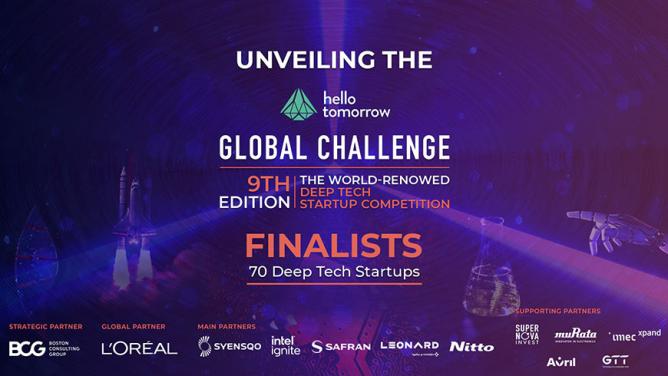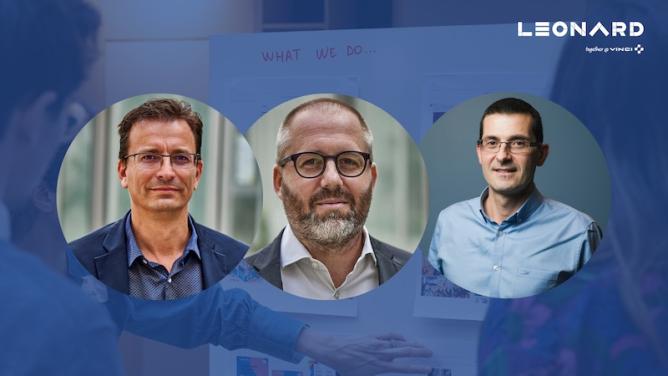The digitalization of construction
Although the construction sector is worth more than 2,000 billion euros in Europe, its productivity has remained stagnant for 20 years.
Thus, as Karim Tamarzist, co-founder of Build2B, points out, “digitalization is the next step to improve the environment“.
Startups supported by Leonard have therefore engaged in ConTech and Proptech to offer innovative solutions and enable the sector to gain in efficiency, performance and competitiveness.
Facilitation of recruitment
“1h to 1h30 is the time spent by an operational in works to find resources“, announces Mounir Bourhara. Build2B promises to reduce this time by developing a platform that connects supply and demand via an instant search engine; a sort of “Malt of construction and real estate, if you will“.
Development of training
Another issue is training, because “to be able to digitize the construction world“, says Karim Fathi, founder of Arsenio, “we first need to train several thousand people per year“.
To do this, the startup offers training courses for professionals from the world of construction and public works, for job seekers, and also for people undergoing professional retraining.
Automation of administrative tasks
Finally, Christian Doumit, head of Fostr, is developing a solution to automate administrative tasks. Indeed, “35% of a project manager’s time in construction is dedicated to administrative and financial processes“. Fostr allows project managers to bring more value to their construction projects by focusing on essential tasks, at the heart of their business.
Discover their testimonies:
Process optimization
“The construction industry loses a considerable amount of time: nearly 30% in non-productive activities“! This is the observation of Yannik Mack, founder of Oculai. “As a result, it currently loses a thousand billion dollars every year“.
Communicating on the job site to improve productivity
Yannik Mack launched his start-up Oculai in order to reduce this loss of time: “thanks to accurate data and by communicating to all the actors involved in the construction process, we have been able to reduce this time significantly and thus improve productivity in construction“.
Switching from paper to digital on the construction site to increase efficiency
“It is essential to optimize the processes on the construction site“, says Steffen Schweiger, founder of Machine26. While the use of paper is still predominant on construction sites, “at Machine26, we offer digital solutions around the life cycle of the machine to facilitate communication, to facilitate collaboration and finally, to optimize the management of the machines“.
Connecting the different communication actors and optimizing the logistics part
Guillaume Richer made the same observation: for him, part of the solution is to improve the flow of information and facilitate communication between the different actors of the communication. Rockease connects transport companies, public works companies and producers to simplify the purchase, sale and transport of aggregates while optimizing the logistics part to reduce the sector’s carbon footprint and thus contribute to making the construction sector more sustainable.
Discover their testimonies:
Towards a circular economy and sustainable construction
“Industrial activities generate more than 90% of the total waste that is generated in the world, 70% of which comes from the construction sector.” Since construction generates a large amount of waste, the goal of Viviana Contreras, CEO and co-founder of Akanthas, is to be able to minimize the sector’s carbon footprint by valorizing this high-potential waste. Akanthas offers a digital solution that uses artificial intelligence to intervene throughout the waste management process: from its production to its treatment.
Proposing more sustainable solutions
Sustainable solutions also involve avoiding waste. Some of this waste is generated by premature demolition of buildings because they no longer meet the needs of users and owners. Aeternum AG, founded by Alex Muresan, fights against this phenomenon by developing a kit that reduces costs, increases the quality of components and allows manufacturing without the need for future project details.
Reuse to limit the impact on the environment
At Inergeen, a project led by Olivier Kerrec, buildings are designed to meet two major challenges: “the first is to have building materials that are eco-responsible. And the second value proposition is to propose an innovative concept of dismountable and above all reassemblable construction that allows for reusable buildings.”
Discover their testimonies:
Are you a startup specializing in the fields of construction, mobility, real estate or energy? Would you like to join the SEED program?
Applications are now open!


